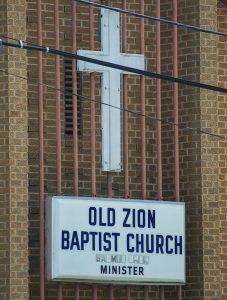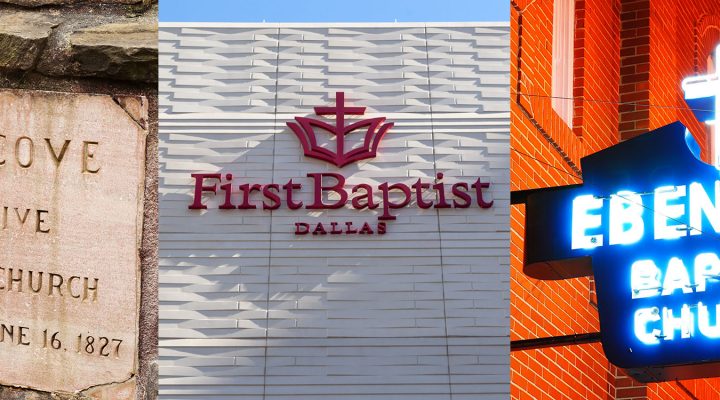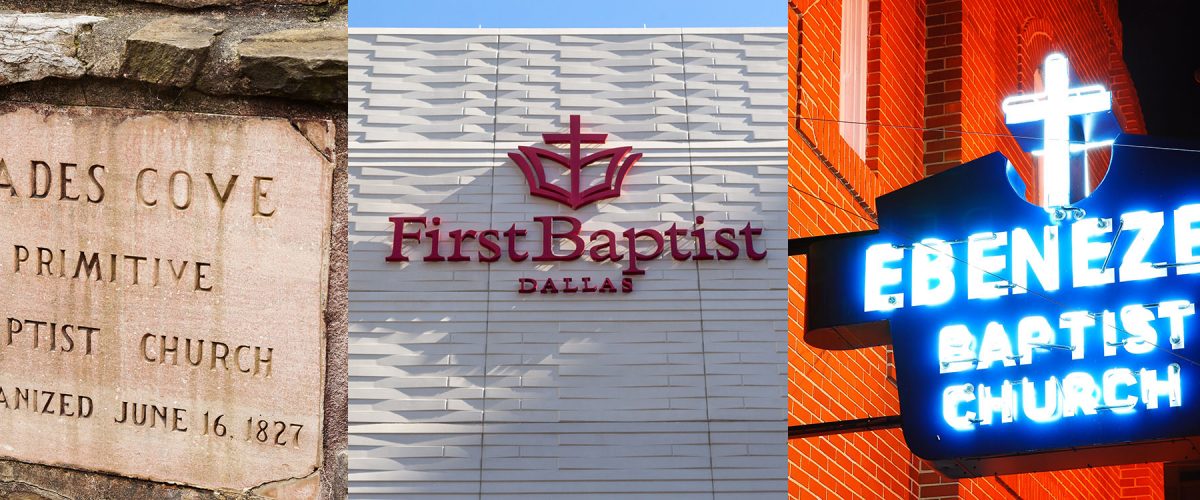These days, it appears Baptist churches and individuals across the theological spectrum are, for a variety of reasons, calling the very name “Baptist” into question. Truth is, that particular Protestant movement was called into question long before the name “Baptist” became its primary designation.
In 1646, Anglican clergyman Daniel Featley wrote of the “Dippers” (AKA Baptists) rampant in England:
They preach, and print, and practice their Heretical impieties openly; they hold their Conventicles weekly in our chief Cities, and Suburbs thereof, and there prophesie by turns; … they build one another in the faith of their Sect, to the ruin of their souls; they flock in great multitudes to their Jordans, and both Sexes enter into the River, and are dipt after their manner with a kind of spell containing the heads of their erroneous tenets, … And as they defile our Rivers with their impure washings, and our Pulpits with their false prophecies and fanatical enthusiasms, so the presses sweat and groan under the load of their blasphemie.

Bill Leonard
“Dipper” was a scornful label visited upon a second-generation Reformation sect born from a mixture of Anabaptist (Mennonite) and English Puritan Separatist theologies, begun in Amsterdam around 1609. The founders exiled themselves there to escape persecution from the Anglican-oriented Christian nationalism of their native England.
Being Baptists, even without that name, they split soon after they began, with some petitioning the Mennonites for entry. Others returned to London in 1612, but the name “Baptist” did not appear until much later.
Their earliest confessions of faith contain multiple identities including, “Churches which are commonly (though falsely) called Anabaptists” (1644); “Thirty Congregations, Gathered According to the Primitive Pattern” (1651); “Several Churches of Christ,” (1654); and “Congregations of Christians (baptized upon Profession of their Faith) in London and the Country,” (1677).
Historian Leon McBeth documents such early names as “Brethren,” “Baptized Brethren,” “Churches of the Baptized Way,” noting “the group had begun to use the name of themselves by the mid-1650s, but not for a full century would ‘Baptist’ be generally accepted.”
Almost from the beginning, Baptist groups developed distinctive, sometimes contradictory, doctrines and practices, forcing them to add clarifying adjectives to their generic name. Even a few examples illustrate the point: General, Particular, Seventh Day, Six Principle, Regular, Separate, Northern, Southern, American, National, Progressive National, Primitive, Free Will, Old Regular, United, Two-Seed-in-the-Spirit (my personal favorite), Eye-Plucking/Hand-Cutting Baptist. (OK, I made the last one up.)
“Four centuries from their historical origins, the Baptist name remains not only controversial, but increasingly questionable to many Americans.”
Four centuries from their historical origins, the Baptist name remains not only controversial, but increasingly questionable to many Americans, a sizable portion of whom are Baptists themselves. Those concerns appeared during the early 2000s when certain right-of-center Baptist churches began dropping or hiding the Baptist name while retaining Baptist affiliations, based on the idea that “American Christians are not interested in brand name churches.”
This seemed particularly characteristic of mega or mega-wannabee Baptist congregations appealing to “seekers,” people often outside traditional denominations.
Seeking to document that approach, I went looking for the Baptist name and identity on the web pages of Saddleback Church, one of America’s most mega congregations. It took me at least three online clicks to discover Saddleback’s affiliation with the Southern Baptist Convention, a rather moot point now given the SBC’s recent excommunication of the church for ordaining and calling women to pastoral ministry.
In a 2005 lecture at Baptist Theological Seminary at Richmond titled “The No-denominationalizing of American Religion,” I offered these observations:
- Denominational systems are disconnecting, disengaging, declining and experiencing general disruption by assorted theological, ethical, organizational and cultural realities and controversies.
- Fewer American Christians think of their primary religious identity in terms of denominational identity.
- Some congregations that claim denominational connections are minimizing their public, theological and fiscal relationships with their parent bodies.
- While many traditional congregations are minimizing their public connections to a denomination, other newly organized churches resist denominational affiliations altogether, preferring to call themselves fellowships or nondenominational community churches.
- Non-affiliation (people who attend religious services seldom or never) is also on the rise in American life.

(Shutterstock)
Those trends have continued to the point that nondenominational churches now claim 13% of Protestant church attenders, up from 9% in 2007. This is now the largest Protestant body in the U.S.
In 2023, it appears certain centrist and left-of-center Baptist congregations are revisiting the Baptist name given what they see as its increasing association in the public square with hard-right theology, ethics and politics. Those rightward Baptist sentiments were dramatically documented in a recent NPR interview with Russell Moore, former SBC insider who recently “resigned” from the SBC and is now editor of Christianity Today.
Moore reported:
Multiple pastors tell me essentially the same story about quoting the Sermon on the Mount parenthetically in their preaching — turn the other cheek — to have someone come up after and to say, where did you get those liberal talking points? And what was alarming to me is that in most of these scenarios, when the pastor would say, “I’m literally quoting Jesus Christ,” the response would not be, “I apologize.” The response would be, “Yes, but that doesn’t work anymore. That’s weak.” And when we get to the point where the teachings of Jesus himself are seen as subversive to them we’re in a crisis.
Reading Moore’s interview reminded me of a similar call I received about five years ago from the pastor of a Cooperative Baptist Fellowship-affiliated congregation, using almost identical descriptions of preaching on similar biblical texts and encountering parallel confrontations with certain church members. It appears the crisis of Baptist identity has become, for some congregations, a concern about public perceptions of the Baptist name itself and a sense that their witness is publicly compromised through such publicly perceived association.
I don’t think a large number of churches will jettison the Baptist name, even as I understand why some congregations may decide to do so. Yet I am persuaded these developments make it essential for Baptist communities of faith to retrace and yes, reassess, their own sense of what it means to claim Baptist identity in the present and for the future.
“No Baptist congregation can or should take it for granted that their members understand the nature of the Baptist identity.”
I am also convinced no Baptist congregation can or should take it for granted that their members understand the nature of the Baptist identity in which their specific church is rooted.
Whether centrist and left-of-center congregations decide to revisit the Baptist name, they should at least reexamine their own Baptist identity through intentional churchwide investigation and instruction in Baptist history, theology and practice. Then they can determine what kind of Baptist congregation they have been, are and want to be.
I also believe such a pursuit never has been more important for Baptists to undertake because:
- The majoritarian Baptist group in the U.S., the SBC, is directly and indirectly setting public agendas for how Americans perceive Baptists in general.
- If Russell Moore’s anecdotal account extends throughout SBC life, then not only is it disconnected from its Baptist moorings but also from its gospel moorings. Other Baptists must be clear on who they are and where their gospel vision takes them.
- As Christian nationalism attempts to insinuate itself into American religious and political institutions, Baptist churches must find ways to resist by affirming the Baptist legacy of religious liberty. Walter Shurden’s emphasis on Baptists’ “Four Fragile Freedoms” — soul liberty, Bible liberty, church liberty, religious liberty — is well worth considering, especially since we now know how fragile those freedoms really are.
- The name “Baptist” is just that, a name, with a with a blessed but somewhat checkered past and now uncertain future. Perhaps the issue for our times is less about a Baptist name than about a Baptist identity, an assertion that the gospel of Christ is still good news to sinners; that God’s grace is not a one-shot deal, but a lifelong encounter; that faith is coerced, not by an imperial church or state, but by the warm winds of the Spirit; that the so-called weakness of the Jesus Way — turn the other cheek, go the extra mile — is, by grace, our greatest strength; and that baptism in lots of water sums all that up as a public sign of the grace that encompasses us.
By grace, I guess I’m just a Dipper at heart.
Bill Leonard is founding dean and the James and Marilyn Dunn professor of Baptist studies and church history emeritus at Wake Forest University School of Divinity in Winston-Salem, N.C. He is the author or editor of 25 books. A native Texan, he lives in Winston-Salem with his wife, Candyce, and their daughter, Stephanie.


